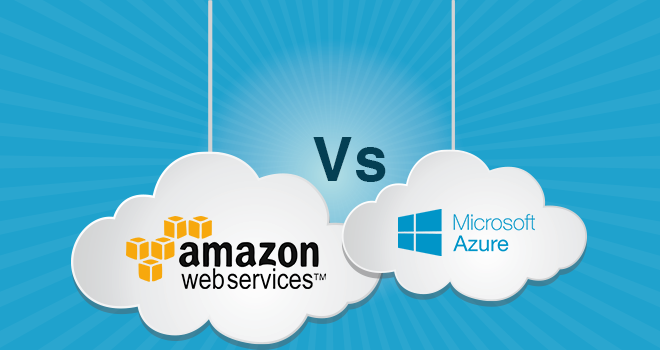
Public cloud services market has seen a steady growth over recent years as private cloud adoption falls - and understandably so. Organizations are able to save as much as 14% of their budgets as an outcome of public cloud adoption. According to a Gartner study, public cloud services market was projected to be at $208 billion in 2016.
In the race of public cloud service providers, Amazon AWS and Microsoft Azure are often regarded as the leading providers of cloud infrastructure. And one of the first things we decide with our customers when starting implementation of their cloud strategy is the provider they should use.
Here we take a look at the advantages of each of these platforms for enterprise customers.
The IaaS space has largely been dominated by AWS till now. But a study conducted in January 2017 showed that Azure has slowly been increasing market penetration and reducing AWS’s share. Azure adoption has grown to around 34% of the market share. So what separates these two providers and how can you decide which IaaS is best for your organization?
1. Service Offerings
The final selection of the cloud provider finally comes down to the needs of a customer, the processes they are moving to the cloud. We have also seen organizations use both providers for different use cases - although most of them prefer to stick to just one.
If you look at the services offered by AWS and Azure, they offer a similar set in most cases - for storage, computation and networking. Both AWS and Azure keep investing in new cloud services and adding a number of tools which customers might need. For instance, both support Hadoop clusters through Elastic Map Reduce (AWS) and HDInsight (Azure). Both companies have also introduced ML tools, mobile hub, IoT tools etc.
The storage options provided by both are also comparable - S3, EBS, Glacier etc on AWS vs Storage service, Blob Storage, backup etc on Azure. They both also support NoSQL (DynamoDB and DocumentDB) and relational databases.
There are however differences as well - which when considered in an enterprise setup can make a huge difference. Some of them are listed below
- EC2 instances are billed by the hour by AWS whereas Azure bills by the minute
- Microsoft’s Hyper-V container technology is interoperable with Azure - which provides an advantage to those who run it in their data centers
2. Pricing
Pricing is always a major consideration when moving to the cloud - the entire operation of cloud migration is expensive - and so every penny saved matters. With the fierce competition amongst cloud providers, the customer wins by often seeing price cuts for the services offered. AWS has been a cheaper option but Microsoft is catching up fast.
Both AWS and Azure provide price calculators for their services (AWS price calculator, Azure calculator) and also offer free tiers for customers to test the waters before jumping all in.
3. Customers
Another factor organizations take into consideration before selecting a provider is their customers. A competitor using a provider can often provide insights on how their services are advantageous in their sector. And AWS clearly wins here.
AWS has a lot of big-ticket names to boast of as customers - including Netflix, Dow Jones, Airbnb, Atlassian, Vodafone among others. Microsoft has lesser number of large customers compared to AWS, but it has managed to get quite a few names on board like GE, Essar, NBC among others.
4. Other Pros & Cons
AWS Wins
One major benefit of AWS is the large number of third party services its marketplace offers - this can be a huge pro for its customers.
Another advantage is its flexibility compared to Azure. When customers are looking for a mix of Microsoft and non-Microsoft services for their technology stack, AWS comes to your rescue by providing the ability to build your solution the way you want it. A lot of open-source solutions available can be run on Linux servers which AWS offers.
A third major advantage AWS offers is the platforms - if you want to run anything other than Windows Server, Azure would not be the best for you. As of now, Azure currently only provides limited support for Linux OS.
Azure Wins
AWS does fall short on certain parameters compared to Azure though. For instance, the sheer number of offerings AWS has - while it is an advantage - can also be a deterrent - it becomes a little difficult to manage at times.
Another major win for Azure is that Microsoft services are already used in a lot of organizations and linking Azure to on-premise MS systems can be a breeze.
The development and testing tools provided by Azure are also superior when compared to AWS.
So - what is best for my organization?
Generally speaking, looking at both the offerings, AWS definitely has an upper hand over Azure. It is more mature as a cloud offering and has the first-mover advantage over competition. The many services it provides, along with support for multiple platforms, makes it ideal for large organizations. Their continuously growing infrastructure also provides an economy of scale which helps in lowering implementation costs.
But that does not dismiss the fact that Azure is quickly catching up with AWS. And they are playing well on their obvious advantage of strong ties with on-premise software - helping more organizations move to a hybrid cloud solution where needed. For organizations which are already heavily into Microsoft in terms of infrastructure and technology skills, for most Azure would be a strong contender.
Still confused which cloud provider would be the best for you? Get in touch.

AWS vs Azure - Which one is the most suitable for your business?
Amazon Web Services and Microsoft Azure public cloud, arguably have the most elaborate and defined set of services to offer. Although there are other...





